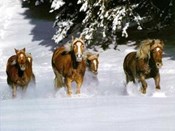Since feet and legs are among the most critical parts of a horse, early consideration should be given them. Shoes should be pulled unless the horse is to be ridden extensively on very rough and abrasive surfaces. The natural foot can stand a lot of use even on hard frozen ground without undue wear, so unless shoes are absolutely necessary, pull them and leave them off. Trim the feet and rasp them every two to three weeks throughout the winter. A few minutes spent with the rasp will probably save at least one and maybe two visits from a farrier during the winter.
The legs should be clean. Mud and snow tend to cake on the long hair (feathers) of the fetlock and cannon. Keep them clipped and remove caked mud, snow and manure. Soreness and ulceration can develop if cleanliness is not maintained. Working with the feet and legs throughout the winter will also give the owner a chance to keep “in touch” with the horse and maintain a continuous check of the health and soundness of the feet.
Fall is an excellent time to check teeth for wear and determine if floating is required. Sharp edges which cut the tongue and cheeks or which prevent proper chewing result in wasted feed, poor food utilization and an unhappy horse. This feed loss can also be expensive to the owner thus resulting in a severe pain in the pocketbook.
About one month after the first killing frost, sometime prior to thanksgiving, every horse should be treated for internal parasites. In order to do a top job, a veterinarian should be given a manure sample and allowed to make a diagnosis of the extent and kind of parasitism. Under veterinary supervision, treatment should be conducted. Where infestations are severe, it may necessary to treat twice. If this double treatment is required, use two different products. This provides a broad spectrum of control. At least one month between treatments is needed.
If the horse is allowed to come and go from a barn at will, he will develop resistance to cold as the seasons change and will also be getting his own exercise. Both are important. The best way to handle horses that are not being used much in the winter is to give them their freedom. Open sheds or open barn doors will allow the horse to seek shelter when it is needed but remain out at other times. Most horses will prefer to stay out if given the choice. This freedom allows them to get exercise. Since the amount of exercise gained through being ridden is drastically reduced in the fall, this is important in maintaining health and condition.
Don’t forget to feed the horse. Most pastures are almost worthless during late fall and winter. Most horses will have been overfed during the summer so some reduction in total feed is acceptable; however, the ration must be well balanced to keep the horse from serious problems. Never change the ration suddenly. Just because the horse has been turned out is no reason to just quit feeding. Taper off the rations until you get what you want. Allow a minimum of two weeks for any adjustment. Get the hay supply bought now. Prices go up later; selection is better now. Check the hay carefully. Make sure of its quality and don’t settle for poor hay. Grains or concentrates could be picked up now if storage space is available. The small amount of nutrient loss in storage will be more than offset by relatively low harvest time prices.
Pregnant mares should be separated from weanlings, open mares and geldings. Mares that are to foal early should be carefully watched. Don’t start overfeeding them though. The mare’s real feed requirement increase comes during lactation, not pregnancy.
Weaning time is also a good time to start basic training. If not already trained to lead, every weanling should be halter trained to stand tied and started to lead. Keep feeding them; in fact, feed them more. There is no milk now and they are in a fast growing stage. It will take a lot of feed to make fat, sleek yearlings next fall.
Yearlings and untrained two-year-olds should be started. Long lining, bitting and general gentling should be started before the weather gets too cold. The bigger ones can even be started under saddle but take it easy.
This is also a good time to get those books and bulletins for home study. Long winter evenings are ideal for knowledge improvement. An outstanding authority on horses has observed that there are three distinct phases in becoming a true horseman. The first phase is one of timidity and wonder, eagerness to learn and acceptance of advice and council. The second phase is one in which the individual “knows all”, is an authority, defies correction and refuses to listen or learn. This is the most dangerous phase. The final phase is one where there is a realization of the tremendous amount of knowledge to be learned and a deep respect for the value of increasing knowledge. Let’s all hope we’re in phase three and on the way to becoming a true horseman.




